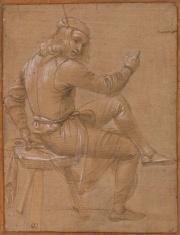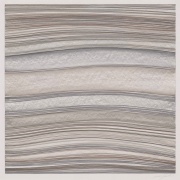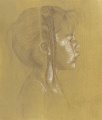Difference between revisions of "Metal point"
| Line 1: | Line 1: | ||
| − | [[File:School of Filippino Lippi 36 417.jpg|thumb|School of Filippino Lippi, about 1457–1504 | + | [[File:School of Filippino Lippi 36 417.jpg|thumb|School of Filippino Lippi, about 1457–1504<br> MFAc# 36.417]] |
== Description == | == Description == | ||
| − | [[File:Susan Schwalb 2003 627.jpg|thumb|Metal point drawing using a variety of metals. Susan Schwalb | + | [[File:Susan Schwalb 2003 627.jpg|thumb|Metal point drawing using a variety of metals. Susan Schwalb<br>MFAc# 2003.627]] |
A metal tool used for drawing on a [[paper]] or [[parchment]] support which has been covered by a [[ground]]. As the point moves across the ground, it leaves behind a thin layer of metal. The thin metal quickly oxidizes. For example, [[silver point]] becomes the brownish grey of tarnished silver and lead point becomes quite dark. The marks made are quite permanent, and the colored ground may be more light-sensitive than the design. Metal points are often prepared from soft metal such as [[silver]], [[gold]], and [[lead]], but may be made from many other metals such as [[bronze]], [[copper]], or [[aluminium]]. Metal point has been used by artists from the 15th century to the present day. | A metal tool used for drawing on a [[paper]] or [[parchment]] support which has been covered by a [[ground]]. As the point moves across the ground, it leaves behind a thin layer of metal. The thin metal quickly oxidizes. For example, [[silver point]] becomes the brownish grey of tarnished silver and lead point becomes quite dark. The marks made are quite permanent, and the colored ground may be more light-sensitive than the design. Metal points are often prepared from soft metal such as [[silver]], [[gold]], and [[lead]], but may be made from many other metals such as [[bronze]], [[copper]], or [[aluminium]]. Metal point has been used by artists from the 15th century to the present day. | ||
| Line 22: | Line 22: | ||
File:Silverpoint_drawnout.jpg|Silver point | File:Silverpoint_drawnout.jpg|Silver point | ||
File:Tin_drawnout.jpg|Tin point | File:Tin_drawnout.jpg|Tin point | ||
| − | File:metalpoint3 100X.jpg|Metalpoint | + | File:metalpoint3 100X.jpg|Metalpoint at 100x |
</gallery> | </gallery> | ||
| Line 28: | Line 28: | ||
* ''Italian Renaissance Drawings: Technical Examination and Analysis''. Janet Ambers, Catherine Higgitt and David Saunders (ed.), The British Museum, 2010. | * ''Italian Renaissance Drawings: Technical Examination and Analysis''. Janet Ambers, Catherine Higgitt and David Saunders (ed.), The British Museum, 2010. | ||
| − | |||
* ''Media & Techniques of Works of Art on Paper'', New York University, New York, 1999 | * ''Media & Techniques of Works of Art on Paper'', New York University, New York, 1999 | ||
| − | |||
* ''The Bullfinch Guide to Art History'', Shearer West (ed.), Bullfinch Press, Boston, 1996 | * ''The Bullfinch Guide to Art History'', Shearer West (ed.), Bullfinch Press, Boston, 1996 | ||
| − | + | * James Watrous, ''The Craft of Old-Master Drawings'', University of Wisconsin Press, 1957. | |
| − | * James Watrous | ||
[[Category:Materials database]] | [[Category:Materials database]] | ||
Revision as of 12:58, 28 May 2023
Description
A metal tool used for drawing on a Paper or Parchment support which has been covered by a Ground. As the point moves across the ground, it leaves behind a thin layer of metal. The thin metal quickly oxidizes. For example, Silver point becomes the brownish grey of tarnished silver and lead point becomes quite dark. The marks made are quite permanent, and the colored ground may be more light-sensitive than the design. Metal points are often prepared from soft metal such as Silver, Gold, and Lead, but may be made from many other metals such as Bronze, Copper, or Aluminium. Metal point has been used by artists from the 15th century to the present day.
Synonyms and Related Terms
metalpoint
Additional Information
Thea Burns. The Luminous Trace: Drawing and Writing in Metalpoint. London: Archetype Publications, 2012.
Additional Images
Resources and Citations
- Italian Renaissance Drawings: Technical Examination and Analysis. Janet Ambers, Catherine Higgitt and David Saunders (ed.), The British Museum, 2010.
- Media & Techniques of Works of Art on Paper, New York University, New York, 1999
- The Bullfinch Guide to Art History, Shearer West (ed.), Bullfinch Press, Boston, 1996
- James Watrous, The Craft of Old-Master Drawings, University of Wisconsin Press, 1957.











